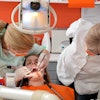
SAN FRANCISCO - Dental practices typically have employee manuals that clearly lay out office policies regarding basic issues such as tardiness, overtime, and benefits.
But they should also have policies covering computer and cellphone use and even body piercing and tattoos, according to a presentation on August 15 at the California Dental Association (CDA) fall meeting.
Robyn Thomason, RDA, an employment practices specialist with the CDA, discussed the importance of office policies and procedures during a well-attended session filled with dentists and office managers.
About 75% of dental practices don't have manuals that address basic employee issues such as holidays, vacations, and sick leave, according to Thomason.
“Breaks are some of the biggest complaints in dental offices”
She stressed the importance of providing clear explanations of what is expected of employees and applying them consistently and fairly among the staff. Tardiness is the No. 1 complaint of dentists, according to Thomason.
Employee manuals should also include required content such as at-will employment agreements and the right of both employer and employee to terminate employment with or without cause.
Dentists who buy established practices sometimes inherit staffs that they just aren't comfortable working with, but the dentist is unsure what to do about it, Thomason noted. She said letting such employees go with a simple "I don't think we're a good fit" explanation is a good enough reason.
Many small offices cut back on benefits during the economic recession, Thomason said.
For dentists looking to reduce overhead, Thomason recommended cutting benefits. "Don't lay off, look at benefits instead," she said. Dentists have the right to change office policies, such as ending paid holidays, if employees are given reasonable notice.
Employees don't have to agree to the policies laid out in the manuals, she pointed out; they just have to sign and acknowledge that they have received and reviewed them.
Manuals should also cover equal opportunity employment issues, such as that harassment and discrimination are illegal and won't be tolerated in the office.
In addition, they should include policies regarding office property, such as computers, lockers, and key cards; for example, it's reasonable to limit the use of office computers to work-related sites only, Thomason noted. Personal use of office computers that contain patient information could leave the practice liable if the data are breached, she said.
Dentists should also consistently apply policies regarding leaves of absence and bereavement. "If you do it for one, you have to do it for all employees," Thomason said.
Trendy issues such as cellphone use also should be addressed. "If you have a policy, you have to adhere to it," Thomason advised, noting that it's reasonable to forbid personal cellphone use unless it's an emergency.
It's also reasonable to have policies regarding tattoos, body piercings, and long dangly earrings, Thomason said, and dentists can require that they can't be visible during work hours. "Employees represent the professional attire and appearance of the office," she noted. If employees have pierced noses, dentists can require them to wear transparent pierces during office hours, she added.
Clear expectations regarding dress codes are another issue that should be in employee manuals, Thomason said. "I remember a dentist who had a front office person who was great, except they didn't dress appropriately on Monday mornings," she recalled.
Timekeeping is another important issue, and manuals should include how overtime and breaks are handled and recorded in case employees later raise complaints. Time records should be kept, and employees are entitled to see them, Thomason noted.
Employees have three years to raise issues about payroll issues, and employers can be penalized for the periods that weren't adequately documented, she pointed out.
Employees who work eight hours in a day are legally entitled to 30-minute lunch breaks and two 10-minute breaks. Overtime is required for either work more than 40 hours a week or eight hours in a day.
"Breaks are some of the biggest complaints in dental offices," Thomason said, and busy offices just have to schedule enough time so employees can take them.
Dentists should plan what holidays the office will be closed and if staff should be paid for them, she said. If holidays fall on weekends or days when the office is scheduled to be closed, dentists are not required to pay for them, Thomason said. And she is seeing more offices open on weekends to accommodate patients' schedules.
What constitutes full- or part-time employment is complicated because most dental offices aren't open 40 hours a week and employees such as hygienists often work one day per week at different offices.
Dentists cannot require employees to waive their legal rights, like being paid for overtime, Thomason noted. But employees can waive their rights to meal and rest breaks if they work less than eight hours. However, if employees don't get meal or rest breaks, they should be paid an extra hour, Thomason said, noting that employers can be penalized if they don't.
She also advised employees and employers alike not to make hasty decisions when it comes to firing someone or quitting following emotional situations. "Wait two days," Thomason said.
The CDA's compass website provides a free employee manual template that includes recommendations regarding employment issues, forms that new employees should fill out, practice management guides, and regulatory laws.



















